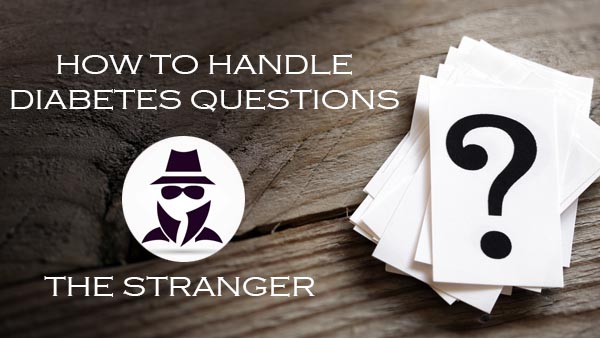
In this series, I give unsolicited advice on how to handle questions we all face in our lives with diabetes, in this day and age, right here in America. I should clarify: not the metaphysical Why are we here, on this planet, right now? Why do I have this pain in the pancreas disease? questions. Rather, this first installment addresses the random, personal queries posed by strangers* that make you and I ask (out loud or to ourselves), Are you kidding me right now?
I’m sure you’re all familiar with this category. These are the ones that still catch me off-guard since getting my first insulin pump over a decade ago. For instance, take encounters with strangers while at work…
I’m lucky to be a lifeguard and work outside in the summer. This means that while wearing a typical standard-issue lifeguard bathing suit, my diabetes accouterments like my pump, site, and CGM are all usually more visible than not. My pump is waterproof, so I can wear it in the water when I teach swimming lessons. My appearance is somewhat unique, as I was reminded by a student with type 1 this summer who will probably always remember me as the (very cool) lifeguard who wears my pretty pink pump with my red bathing suit.
Sometimes I forget about the visual display of my apparatus in the course of daily living—and, like many people who wear insulin pumps, I rotate my pump sites between my abdomen, legs, and arms—until I walk past a patron on the beach, who yelled, “WHAT HAPPENED TO YOUR ARM?” before adding a quick “sorry if that was rude” under her breath. Oh, I don’t think we need to consult New York Times Social Q’s columnist Philip Galanes to confirm that it WAS rude, lady! Later, my co-worker wittily suggests that next time I reply with equal gusto, “What happened to your FACE?”
Instead, I smile, take a deep breath, and give her my well-practiced spiel: “I have type 1 diabetes and this is my continuous glucose monitor and insulin pump.”**
As good as it can feel to throw a careless remark back from whence it came, a simple deep breath does a lot to diffuse such a situation with high potential for awkwardness for several reasons:
- The breath allows for a pause, during which the nosy question-asker usually realizes they should pay closer attention to their impulses/tone/word choice/all of the above next time they notice something out of the ordinary about a fellow human being.
- The inhale of this breath gives the subject of the nosy question a precious split-second of reflection about the asker’s humanity/blissful ignorance/immature expressions of empathy—and allows for a positive voice to chime into our heads: Perhaps we shouldn’t cut off their heads; maybe they actually mean well?
- After the inhale injects us with compassion, the exhale that follows gives the response an air of dignity and composition, no matter its content. We are all experts on our own diabetes, are we not?
It’s hard to remember or to want to do this all the time. I know you’re all wondering: so, yes, sometimes I indeed fail to take this deep breath. Like when I was quietly trying to navigate through Wal-Mart and a gentleman felt entitled to repeatedly ask me if I were trying to quit smoking because he spotted a “patch” I was wearing. I did not take a deep breath before saying no, twice (did he not believe me the first time?), and zooming away with my shopping cart. I just wanted to find the laundry detergent aisle.
The deep breath does help me when grown adults nervously joke, “What’s with all the, ah, electrodes?” and it gives me the presence of mind to recall what’s important to me.
It reminds me that every time I’m asked a question is another opportunity to educate someone about diabetes. It reminds me of how self-conscious I was when I first got my pump and how, if you asked teenage Katie about the weird metal box with plastic tubes, she would have rather crawled under a rock than admitted to the world that she had diabetes. Good luck to you if you were to time-travel back to 2005 and tell teenage Katie that she will someday encourage people to ask her questions about diabetes (gasp!).
My self-conscious teenage self and other kids struggling to figure out a society that has its moments of loud confrontations of any sort of difference are the biggest reasons why I try my best not to yell or scream or pull out my hair in response to frustrating people. Maybe if I educate them (and also if they develop a little self-awareness), then the next time they spot a stranger—child or adult—with tubes or stickers or transmitters, a little bell will ding in their head and they will approach the situation with more sensitivity and understanding.
Maybe they’ll think, “Wow! How brave of that person! For going to the beach/wearing that outfit/walking through Wal-Mart! And all while managing a challenging chronic condition! Bravo!” and send some sunny vibes their way.
Or maybe they’ll give a polite closed-mouth smile and walk past in silence, secretly relieved: “The last time I asked someone what was with their plastic tubes, she talked to me about diabetes for half an hour. Now I can just mind my own business, having showed my support by making an online donation to a worthy cause such as Life for a Child, and will hopefully make it home in time to catch the new episode of American Ninja Warrior.”
Maybe my effort to respond to (most) diabetes-related questions in a calm, composed way, relishing in the chance to impart valuable diabetes information onto a person (formerly) reckless with their curiosity, will make it easier for other people with diabetes and other conditions; a kind of pay-it-forward.
For further information:
Now, I dare strangers to ask me about my accouterments. Beware: Your ear may be talked off. Ask at your own risk!
*Stranger (n.) strang·er \ˈstrān-jər\ Someone who you have not met before or do not know; someone who has not experienced something; someone who is in a new and unfamiliar place.
To reiterate: this article is not relevant to diabetes questions asked by people that know you or whom you have previously met. See: acquaintances and a future article.
**Non-diabetes friends: try saying that 10 times fast.
Part 2 - How to Handle Diabetes Questions: The New Friend
Part 3 - How to Handle Diabetes Questions: People You Know
I hope you liked the first part of this article. Don't forget to read part 2.
TheDiabetesCouncil Article | Reviewed by Dr. Sergii Vasyliuk MD on June 06, 2020






